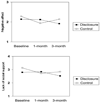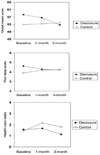The health effects of at-home written emotional disclosure in fibromyalgia: a randomized trial
- PMID: 16972811
- PMCID: PMC2935262
- DOI: 10.1207/s15324796abm3202_11
The health effects of at-home written emotional disclosure in fibromyalgia: a randomized trial
Abstract
Background: The presence and severity of the chronic pain syndrome fibromyalgia (FM) is associated with unresolved stress and emotional regulation difficulties. Written emotional disclosure is intended to reduce stress and may improve health of people with FM.
Purpose: This study tests the effects of at-home, written emotional disclosure about stressful experiences on the health of people with FM and uses multiple follow-ups to track the time course of effects of disclosure.
Methods: Adults with FM (intention-to-treat, n=83; completers, n=72) were randomized to write for 4 days at home about either stressful experiences (disclosure group) or neutral time management (control group). Group differences in immediate mood effects and changes in health from baseline to 1-month and 3-month follow-ups were examined.
Results: Written disclosure led to an immediate increase in negative mood, which did not attenuate across the 4 writing days. Repeated-measures analyses from baseline to each follow-up point were conducted on both intention-to-treat and completer samples, which showed similar outcomes. At 1 month, disclosure led to few health benefits, but control writing led to less negative affect and more perceived support than did disclosure. At 3-month follow-up, these negative affect and social support effects disappeared, and written disclosure led to a greater reduction in global impact, poor sleep, health care utilization, and (marginally) physical disability than did control writing. Interpretation of these apparent benefits needs to be made cautiously, however, because the disclosure group had somewhat poorer health than controls at baseline and the control group showed some minor worsening over time.
Conclusions: Written emotional disclosure can be conducted at home, and there is tentative evidence that disclosure benefits the health of people with FM. The benefits, however, may be delayed for several months after writing and may be of limited clinical significance.
Figures


References
-
- Hayes SC, Wilson KG, Gifford EV, Follette VM, Strosahl K. Experimental avoidance and behavioral disorders: a functional dimensional approach to diagnosis and treatment. Journal of Consulting & Clinical Psychology. 1996;64:1152–1168. - PubMed
-
- Barlow DH, Allen LB, Choate ML. Toward a unified treatment for emotional disorders. Behavior Therapy. 2004;35:205–230. - PubMed
-
- Taylor GJ, Bagby RM, Parker JDA. Disorders of affect regulation: Alexithymia in medical and psychiatric illness. Cambridge: Cambridge University Press; 1997.
-
- Austenfeld JL, Stanton AL. Coping through emotional approach: a new look at emotion, coping, and health-related outcomes. Journal of Personality. 2004;72:1335–1363. - PubMed
-
- Wenzlaff RM, Wegner DM. Thought suppression. Annual Review of Psychology. 2000;51:59–91. - PubMed
Publication types
MeSH terms
Grants and funding
LinkOut - more resources
Full Text Sources
Medical

